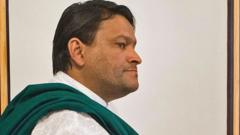The assassination of Muhsin Hendricks, known for his inclusive approach to Islam, has caused distress within the LGBTQ+ circles but has simultaneously ignited a renewed push for equality in religious domains across South Africa.
Tragic Loss of Trailblazing Imam Muhsin Hendricks Sparks Fear and Resolve Within LGBTQ+ Community

Tragic Loss of Trailblazing Imam Muhsin Hendricks Sparks Fear and Resolve Within LGBTQ+ Community
The execution of South Africa's first openly gay imam, Muhsin Hendricks, has galvanized the LGBTQ+ community to fight against marginalization, despite fears for their safety.
The recent assassination of Muhsin Hendricks, the world's first openly gay imam, has left the South African LGBTQ+ community grappling with fear and grief while simultaneously rallying to uphold the fight for equality in religious spaces. Hendricks was brutally murdered in an apparent targeted attack in Gqeberha, sending shockwaves throughout the community he passionately advocated for. Reverend Toni Kruger-Ayebazibwe, an openly gay Christian cleric, described Hendricks as a "gentle spirit" who shone light in even the darkest of environments, underscoring the deep void his death has left.
The 57-year-old imam had traveled to Gqeberha to officiate the marriages of two interfaith heterosexual couples, a bold act considering the traditional stance of imams in South Africa, who rarely oversee such unions. This commitment to inclusivity stood as a testament to Hendricks' mission of breaking barriers within the religious sphere, fostering acceptance for LGBTQ+ individuals in a faith often seen as unwelcoming.
In response to the heinous crime, both the Muslim Judicial Council and the United Ulama Council of South Africa have condemned the execution-style murder, calling for unity and respect despite differing views. Despite this, Hendricks faced significant opposition from some religious leaders who failed to recognize his contributions, referring to him dismissively as "Mr. Hendricks" rather than by his religious titles.
Hendricks was not only a pioneer in his personal life, having come out as gay in 1996, but he also established The Inner Circle, a supportive community for queer Muslims, which proved instrumental in helping many reconcile their faith with their identity. His work underscored the realities of a thriving LGBTQ+ community within the nation, yet discrimination and violence persist against its members.
Despite the progress in LGBTQ+ rights in South Africa, where same-sex marriage was legalized in 2006, the battle for acceptance within many religious circles remains fraught. As noted by Reverend Ecclesia de Lange from Inclusive and Affirming Ministries, traditional interpretations of sacred texts continue to create barriers.
The aftermath of Hendricks' murder has also raised concerns among community leaders regarding safety, yet many, including Reverend Kruger-Ayebazibwe, assert that such violence will not dissuade activism. The tragedy has ignited a determination within the LGBTQ+ community to commemorate Hendricks' legacy while championing the rights of individuals like him who seek acceptance in the religious landscape.
Hendricks was laid to rest in a private ceremony, but a public memorial is anticipated to celebrate his monumental achievements and advocacy for inclusivity in faith. Teboho Klaas from The Other Foundation poignantly remarked that although Hendricks' life was taken, his impact will endure through the movement he championed, ensuring that his vision of inclusivity will continue to resonate beyond his untimely death.



















